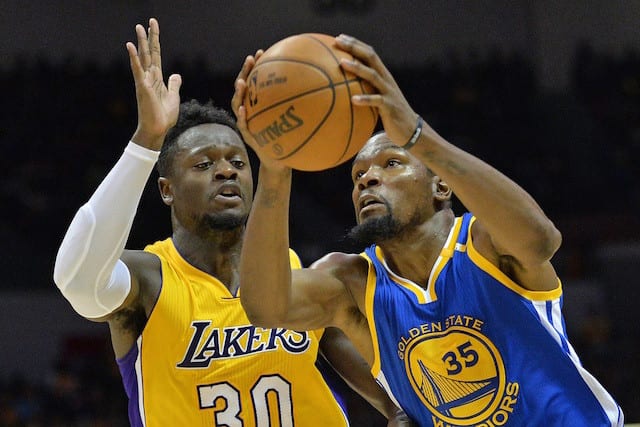At this point in the NBA season, you should have a decent idea of what your team’s strengths and weaknesses are. Some of those weaknesses can be fixed by smart waiver wire decisions, but ultimately, if your team has a serious flaw, a trade may be the only remedy. It’s also your only option to land a quality player that you coveted during the draft but missed out on.
Of course, that isn’t necessarily a bad thing. Crafting a perfect deal can be one of the most enjoyable parts of the fantasy season, particularly when you negotiate back-and-forth several times before finding common ground.Trades really can be the most exciting part of the fantasy season. I still remember deals I made, both good and bad, in leagues years ago that ultimately swung the balance of power and made a difference in the outcome of the season.
Here are three simple rules to help you wheel and deal in your league.
Trade For Value, Not Names
The great thing about fantasy basketball is that you don’t necessarily have to have a superstar to win. There are plenty of under-the-radar players out there that produce at a superstar level in fantasy basketball but don’t carry the same weight in reality.
The classic example is Brent Barry, who was never considered anything more than a role player in the NBA, but his 2001-02 numbers of 14.4 points, 5.4 rebounds, 5.3 assists, 1.8 steals, and two threes while shooting 51 percent from the field and 85 percent from the line made him fantasy gold.

Barry’s across-the-board production was often undervalued in fantasy leagues due to his modest point totals and lack of superstar status, and some not-so-wise owners parted with him to get their hands on a household name.
As The Rock said, it doesn’t matter what your name is. All that matters is how a player produces, so offering a big-name player for a guy who has less real-life value but better fantasy production can be a great move.

Find A Trade Partner Whose Needs Match Your Strengths
Value is all about supply and demand, so if you can find a team with a major need that happens to be an area you have a surplus in, you may be able to get a handsome return on your asset. For example, if you drafted Hassan Whiteside and Myles Turner, you are all set on blocks. If you have a player like Rudy Gobert, you can easily part with him without hurting your team in that category. The key to making a good deal is to find someone who needs what you are selling and then getting something you need in return.

Find A Trade That Is Mutually Beneficial
Perhaps the most underrated part of making a fantasy basketball trade is finding a deal that is beneficial to both sides. Too often owners focus on just their side of the trade, hoping to fleece the other team and propel their squad to the top of the league. I get it, fantasy basketball is competitive, after all, and since almost all of it is played online against strangers it’s easy not feel bad about pulling a fast one on an unsuspecting opponent.
One way that this happens is by offering up trades with recently injured players, hoping that the other owner isn’t wise and will take the offer. Not only is this dishonest, but it fosters ill-will in the league. This can be especially critical when you are in a keeper league, dynasty league, or any other kind of league that lasts more than a single season. Owners won’t soon forget that you tricked them, and that can be a roadblock when it comes to future trades as well as a disruptor to league harmony.
Another type of deal that I see quite a bit is two-for-one or three-for-one deals. These can have their merit, but in leagues that are standard size (10 teams) or less, it’s almost always better to take the better player. Teams will offer up quantity for quality trades hoping that owners overlook the value of a free roster spot. In a shallow league that spot carries value, so a deal of say Jimmy Butler and Blake Griffin for Kevin Durant may sound somewhat reasonable on the surface, the true deal is Butler/Griffin for Durant and whoever would have to be dropped to accept the deal.
Most seasoned owners simply laugh off these kinds of offers, but they are still offered up quite a bit in the hopes that a newbie hits the accept button. Again, the goal of a deal should be to provide both teams with something that they need, and these sneaky two-for-one deals very rarely do that.
Trading isn’t easy, but it’s one of the most exciting parts of fantasy basketball. So get out there, toss out some offers, and enjoy the process of negotiating a deal.






